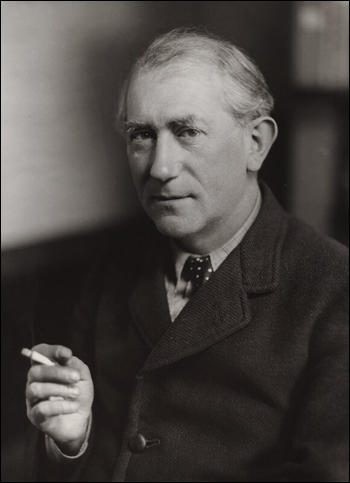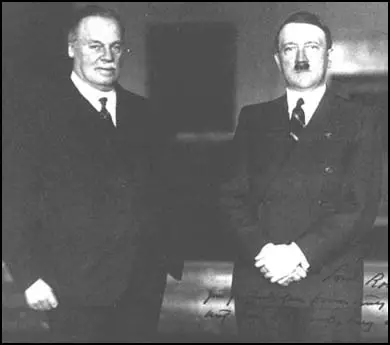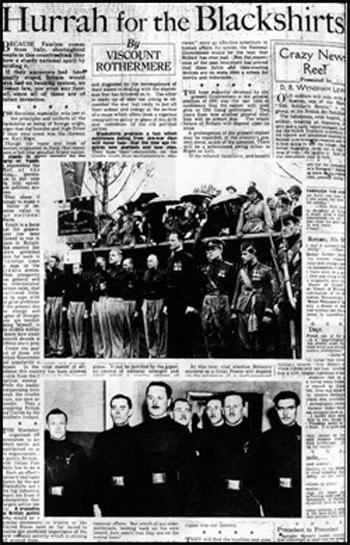January Club
The January Club was a product of the dinners and functions held by Robert Forgan, a member of the British Union of Fascists (BUF) during the autumn of 1933. Forgan, a former member of the Labour Party, served on the Glasgow Town Council (1926-29) before being elected to represent West Renfrew in May 1929. However, he left the party and gave his support to Oswald Mosley after he resigned from the government over his economic plan that included the provision of old-age pensions at sixty, the raising of the school-leaving age and an expansion in the road programme, had been rejected by Ramsay MacDonald. (1)
The chairman of the January Club was Sir John Collings Squire, who claimed that membership was open to anyone who was "in sympathy with the the Fascist movement". Squire's biographer, Patrick J. Howarth, claimed that "They believed that the present democratic system of government in this country must be changed, and although the change was unlikely to come about suddenly, as it had in Italy and Germany, they regarded it as inevitable." (2) The secretary of the January Club was Captain H. W. Luttman-Johnson and it has been argued that "the correspondence between Luttman-Johnson and Mosley leaves no doubt that the January Club was designed as a front organization for the BUF". (3)
The club stated that its objectives included: "(i) To bring together men who are interested in modern methods of government. (ii) To provide a platform for leaders of Fascist and Corporate State thought. The club, however, will not formulate any policy of its own. (iii) To enable those who are propagating Fascism to hear the views of those who, while sympathizing with and students of twentieth-century political thought, are not themselves Fascists." (4)
The journalist and novelist, Cecil Roberts, attended one of their first meetings with his friend, Francis Yeats-Brown. He later recalled: The majority appeared to be tentative enquirers like myself. Some of the speeches struck a note of accord in their deprecation of the lassitude of our Government. On invitation I spoke myself, expressing all my pent-up indignation and alarm. Sir John Squire, who was present, an enquirer like myself, repeatedly congratulated me on that speech." (5)
Members of the January Club included Basil Liddell Hart, General Sir Hubert Gough, Wing-Commander Sir Louis Greig, Gentleman Usher to the King George VI, Sir Henry Fairfax-Lucy, Sir Philip Magnus-Allcroft MP, Sir Thomas Moore and Ralph Blumenfeld, the editor of the Daily Express. (6) Speakers at the meetings included Mary Allen, the commander of the Women's Police Service since 1920, William Joyce, Muriel Innes Currey, Alexander Raven Thomson and Air Commodore John Adrian Chamier. (7) Richard C. Thurlow has pointed out that the January Club, was part of the "considerable hidden history of British fascism." (8)

Stephen Dorril has explained that the men who established the January Club later admitted that its main objective was to provide a platform for Oswald Mosley and the British Union of Fascists (BUF). (9) "At a conference in the Home Office in November 1933 attended by the Commissioner of the Metropolitan Police, two officers of MI5 and a superintendent from Special Branch, it was decided that information should be systematically collected on fascism in the United Kingdom." (10) These reports from MI5 pointed out that the January Club was "a powerhouse for the development of Fascist culture" and "it brought fascism to the notice of large numbers of people who would have considered it much less favourably otherwise." (11)
One of its most important supporters was the newspaper baron, Harold Harmsworth, the 1st Lord Rothermere. According to S. J. Taylor, the author of The Great Outsiders: Northcliffe, Rothermere and the Daily Mail (1996), as early as 1931, Rothermere was offering to place "the whole of the Harmsworth press at Mosley's disposal". Rothermere believed that Mosley and his fledgling Fascists represented "sound, commonplace, Conservative doctrine". Inspired by "loyalty to the throne and love of country", they were little more than an energetic wing of the Conservative Party". (12)
After the 1933 General Election, Chancellor Adolf Hitler proposed an Enabling Bill that would give him dictatorial powers. Such an act needed three-quarters of the members of the Reichstag to vote in its favour. All the active members of the Communist Party, were in prison, in hiding, or had left the country (an estimated 60,000 people left Germany during the first few weeks after the election). This was also true of most of the leaders of the other left-wing party, Social Democrat Party (SDP). However, Hitler still needed the support of the Catholic Centre Party (BVP) to pass this legislation. Hitler therefore offered the BVP a deal: vote for the bill and the Nazi government would guarantee the rights of the Catholic Church. The BVP agreed and when the vote was taken on 24th March, 1933, only 94 members of the SDP voted against the Enabling Bill. (13)
Soon afterwards the Communist Party and the Social Democrat Party became banned organisations. Party activists still in the country were arrested. A month later Hitler announced that the Catholic Centre Party, the Nationalist Party and all other political parties other than the NSDAP were illegal, and by the end of 1933 over 150,000 political prisoners were in concentration camps. Hitler was aware that people have a great fear of the unknown, and if prisoners were released, they were warned that if they told anyone of their experiences they would be sent back to the camp. (14)
Lord Rothermere produced a series of articles acclaiming the new regime. The most famous of these was on the 10th July when he told readers that he "confidently expected" great things of the Nazi regime. He also criticized other newspapers for "its obsession with Nazi violence and racialism", and assured his readers that any such deeds would be "submerged by the immense benefits that the new regime is already bestowing on Germany." He pointed out that those criticizing Hitler were on the left of the political spectrum: "I urge all British young men and women to study closely the progress of the Nazi regime in Germany. They must not be misled by the misrepresentations of its opponents. The most spiteful distracters of the Nazis are to be found in precisely the same sections of the British public and press as are most vehement in their praises of the Soviet regime in Russia." (15)
Hitler acknowledged this help by writing to Rothermere: "I should like to express the appreciation of countless Germans, who regard me as their spokesman, for the wise and beneficial public support which you have given to a policy that we all hope will contribute to the enduring pacification of Europe. Just as we are fanatically determined to defend ourselves against attack, so do we reject the idea of taking the initiative in bringing about a war. I am convinced that no one who fought in the front trenches during the world war, no matter in what European country, desires another conflict." (16) In another article Lord Rothermere called for Hitler to be given back land in Africa that had been taken as a result of the Versailles Treaty. (17)

As Richard Griffiths, the author of Fellow Travellers of the Right (1979) has pointed out: "Rothermere visited Hitler on a number of occasions, and corresponded with him. As we have seen, Hitler's first major dinner party for foreigners, on 19th December 1934, had as its guests of honour Rothermere, his son Esmond Harmsworth, and Ward Price, together with Ernest Tennant. Rothermere's subsequent article in the Daily Mail was violently enthusiastic about what Hitler had done for Germany. Hitler wrote a number of important letters to Rothermere in 1933 and 1934, but the most interesting of them, because of its subsequent fate, was the one written on 3 May 1935 in which he advocated Anglo-German understanding as a firm combination for peace. Rothermere circulated this to many politicians, convinced that his personal contact with Hitler had produced a real breakthrough." (18)
Lord Rothermere also gave his full support to Oswald Mosley and the National Union of Fascists. He wrote an article, Hurrah for the Blackshirts, on 22nd January, 1934, in which he praised Mosley for his "sound, commonsense, Conservative doctrine". Rothermere added: "Timid alarmists all this week have been whimpering that the rapid growth in numbers of the British Blackshirts is preparing the way for a system of rulership by means of steel whips and concentration camps. Very few of these panic-mongers have any personal knowledge of the countries that are already under Blackshirt government. The notion that a permanent reign of terror exists there has been evolved entirely from their own morbid imaginations, fed by sensational propaganda from opponents of the party now in power. As a purely British organization, the Blackshirts will respect those principles of tolerance which are traditional in British politics. They have no prejudice either of class or race. Their recruits are drawn from all social grades and every political party. Young men may join the British Union of Fascists by writing to the Headquarters, King's Road, Chelsea, London, S.W." (19)

The Daily Mail continued to give its support to the fascists. Lord Rothermere allowed fellow member of the January Club, Sir Thomas Moore, the Conservative Party MP for Ayr Burghs, to publish pro-fascist articles in his newspaper. Moore described the BUF as being "largely derived from the Conservative Party". He added "surely there cannot be any fundamental difference of outlook between the Blackshirts and their parents, the Conservatives?" (20)
George Ward Price wrote about anti-fascist demonstrators at a meeting of the National Union of Fascists on 8th June, 1934: "If the Blackshirts movement had any need of justification, the Red Hooligans who savagely and systematically tried to wreck Sir Oswald Mosley's huge and magnificently successful meeting at Olympia last night would have supplied it. They got what they deserved. Olympia has been the scene of many assemblies and many great fights, but never had it offered the spectacle of so many fights mixed up with a meeting." (21)
Some members of the Conservative Party felt uncomfortable about the levels of anti-Semitism expressed in January Club meetings. After one especially unpleasant speech by a BUF member, Cecil Roberts decided he would no longer attend these gatherings. He told Sir John Collings Squire: "The effect of his tirade was to kill any thought of belonging to a party that harboured such a man... I'll sooner take rat poison than join up with a fellow like that." (22)
Primary Sources
(1) Stephen Dorril, Black Shirt: Sir Oswald Mosley and British Fascism (2006)
A Bengal Lancer and like Yeats-Brown a Cavalry Club member, Luttman-Johnson left India and moved to Scotland, where he enjoyed shooting on his Perth estate. Following the death of his wife in 1930 "Uncle Bill", according to his nephew, sold Railton cars and for financial reasons had "fallen in with Mosley, who employed him in some capacity". He hated Communism, extolled Mussolini and, somewhat less so, Hitler. In December he helped create a club to "inquire upon modern methods of Government". Its remit was vague so that those "who did not wish to openly embrace membership of the BUF could nonetheless support it". Mosley saw it as an opportunity to build a wider Fascist movement.
Forgan's debating club was established in the new year as the January Club. MI5 identified Forgan, Sir Donald Makgill, Yeats-Brown and Luttman-Johnson as co-founders. Sir John Squire and Luttman-Johnson became Chairman and Secretary respectively of a front organization controlled by Forgan, who nominated its officials. Squire said he was happy to be one of Mosley's lieutenants: "I have been one in spirit ever since he resigned his Cabinet job over unemployment." Luttman-Johnson admitted the Club had been founded as a platform for Mosley. Lord Midleton, former Secretary of State for War, put his Mayfair flat at the Club's disposal. It was run by George Makgill's sun Donald, whose wife, Esther, ran the BUF's Ladies' Section - an example of continuity with twenties proto-Fascism.
MI5 viewed the Club as a powerhouse for the development of Fascist culture. It "brought fascism to the notice of large numbers of people who would have considered it much less favourably otherwise". Patrons includrd the English Review Circle and a network of aristocrats, diplomats and military men from Mosley's social circle. It attracted 200 influential figures who dined at the Savoy or the Hotel Splendide, with reports featured in the Tatler. Members included Lord Rothermere, Lord Lloyd, Basil Liddell Hart, Sir Henry Fairfax-Lucy, General Sir Hubert Gough, Sachie Sitwell, Sir Philip Magnus-Allcroft MP and Ralph Blumenfeld. Those in regular attendance were Wing-Commander Sir Louis Greig, Gentleman Usher to the King, Lord Erskine, eldest son of the Earl of Mar and an assistant government Whip, and Lord William brother of the Duke of Buccleuch. Guests included ex-BF member the Earl of Glasgow and Lady Russell of Liverpool, and directors of Siemens, London Assurance, Vickers, Handley Page and Morgan Grenfell. Speakers included Forgan and Raven Thomson, and BUF sympathizers such as Miss Muriel Currey, Commandant Mary Allen and Air Commodore J. A. Chamier.
